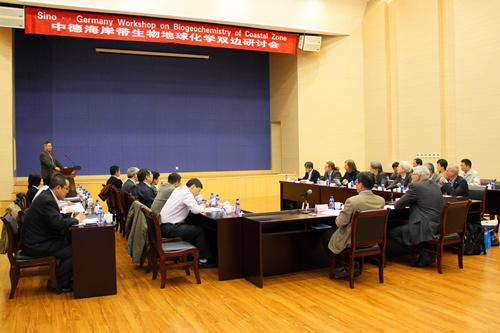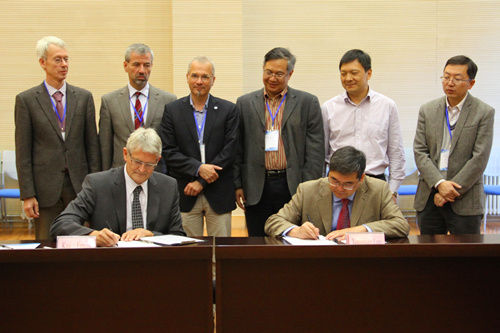16th -18th October, 2014, a delegation of nine scientists from the Institute of Coastal Research, Helmholtz-Zentrum Geesthacht (HZG-IFK), led by Prof. Kay Emeis, was visiting the Yantai Institute of Coastal Zone Research, Chinese Academy of Sciences (CAS-YIC). During the visit, the two institutes of coastal research re-signed a comprehensive cooperation agreement, and held the “Sino – Germany Workshop on Biogeochemistry of Coastal Zone”. In the workshop opening, addresses were given at beginning by Prof. Yongming Luo, the director of CAS-YIC, and Prof. Kay Emeis, as they both expressed great visions for the future cooperation. The CAS-YIC and the HZG-IFK reached a consensus on scientific questions and research areas in the coastal zone, which had been concerned by both institutes. Based on this opportunity, a new cooperation agreement was signed by Prof. Luo and Prof. Emeis, representing CAS-YIC and HZG-IFK respectively.
During the two-day workshop, a total of 21 distinguished scientific presentations were given by 7 scientists from HZG-IFK (Prof. Kay Emeis, Prof. Ralf Ebinghaus, Prof. Justus van Beusekom, Prof. Kai Wirtz, Dr. Ulrich Callies, Dr. Volker Matthias and Dr. Daniel Pr?frock) and 13 researchers from CAS-YIC, on the topics of “Eutrophication, sediment-water exchange and ecosystem Services”, “Oil spills – effects, drift modeling and remediation”, “Model development and application” and “Chemical pollution and effects”. Based on various levels and aspects, the concerned scientific hotspots were explained and analyzed, such as coastal eutrophication, nitrogen cycle (biogeochemical cycle), sustainability and biological resources in the coastal zone and coastal hazards, prediction and remediation. Focus on these, the further discussions and wildly communications were carried out among attendees including other staffs and graduate students from CAS-YIC.
At last, to summarize the workshop, Prof. Luo and Prof. Emeis re-emphasized the significance and forwardness of the coastal science and research, and restated bilateral communication and cooperation of different meanings on both scientific interests before long. Later, the subsequent details of personnel exchange, project cooperation and application, and conference organization were discussed to reach agreement. At the same time, a working group was set up to promote the bilateral cooperation in future.
After the workshop, the HZG-IFK group also visited the major laboratories, experimental facilities and Muping long-term experimental station.

